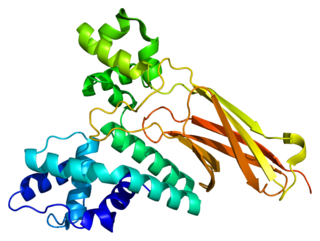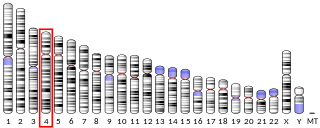
The CLCN family of voltage-dependent chloride channel genes comprises nine members which demonstrate quite diverse functional characteristics while sharing significant sequence homology. The protein encoded by this gene regulates the electric excitability of the skeletal muscle membrane. Mutations in this gene cause two forms of inherited human muscle disorders: recessive generalized myotonia congenita (Becker) and dominant myotonia (Thomsen).

Adenylyl cyclase type 6 is an enzyme that in humans is encoded by the ADCY6 gene.

Solute carrier family 23 member 2 is a protein that in humans is encoded by the SLC23A2 gene.

U5 small nuclear ribonucleoprotein 200 kDa helicase is an enzyme that in humans is encoded by the SNRNP200 gene.

Ninein is a protein that in humans is encoded by the NIN gene.

Chloride channel protein 2 is a protein that in humans is encoded by the CLCN2 gene. Mutations of this gene have been found to cause leukoencephalopathy and Idiopathic generalised epilepsy, although the latter claim has been disputed. CLCN2 contains a transmembrane region that is involved in chloride ion transport as well two intracellular copies of the CBS domain.

H+/Cl− exchange transporter 3 is a protein that in humans is encoded by the CLCN3 gene.

Chloride channel 7 alpha subunit also known as H+/Cl− exchange transporter 7 is a protein that in humans is encoded by the CLCN7 gene. In melanocytic cells this gene is regulated by the Microphthalmia-associated transcription factor.

Chloride channel Kb, also known as CLCNKB, is a protein which in humans is encoded by the CLCNKB gene.

Splicing factor 3B subunit 3 is a protein that in humans is encoded by the SF3B3 gene.

TRIO and F-actin-binding protein is a protein that in humans is encoded by the TRIOBP gene.

Pre-mRNA-splicing factor ATP-dependent RNA helicase PRP16 is an enzyme that in humans is encoded by the DHX38 gene.

RNA-binding protein 12 is a protein that in humans is encoded by the RBM12 gene.

Hypermethylated in cancer 2 protein is a protein that in humans is encoded by the HIC2 gene.

Mesoderm development LRP chaperone, or MESD, is a protein that in humans is encoded by the MESD gene.

KIAA0930 is a protein that, in humans, is encoded by the KIAA0930 gene.

Methyltransferase-like protein 13 is an enzyme that in humans is encoded by the METTL13 gene.

CDK12 cyclin-dependent kinase 12 is a protein kinase that in humans is encoded by the CDK12 gene. This enzyme is a member of cyclin-dependent kinase protein family.

Chloride channel CLIC-like 1 also known as CLCC1 is a human gene.

The CD302 antigen also known as C-type lectin domain family 13 member A is a protein that in humans is encoded by the CD302 gene.

















